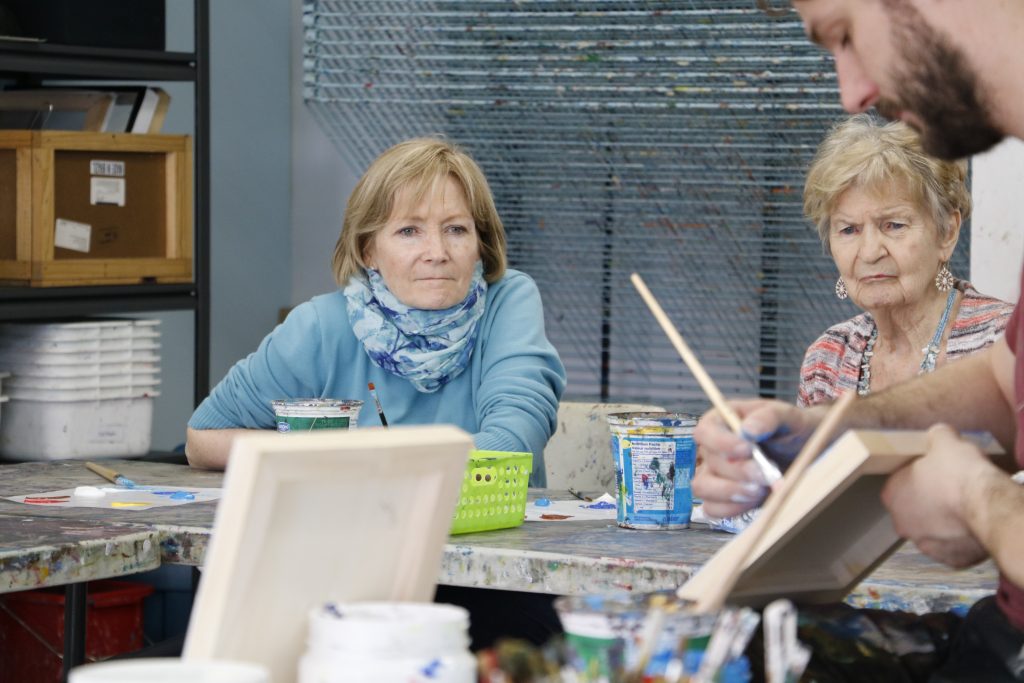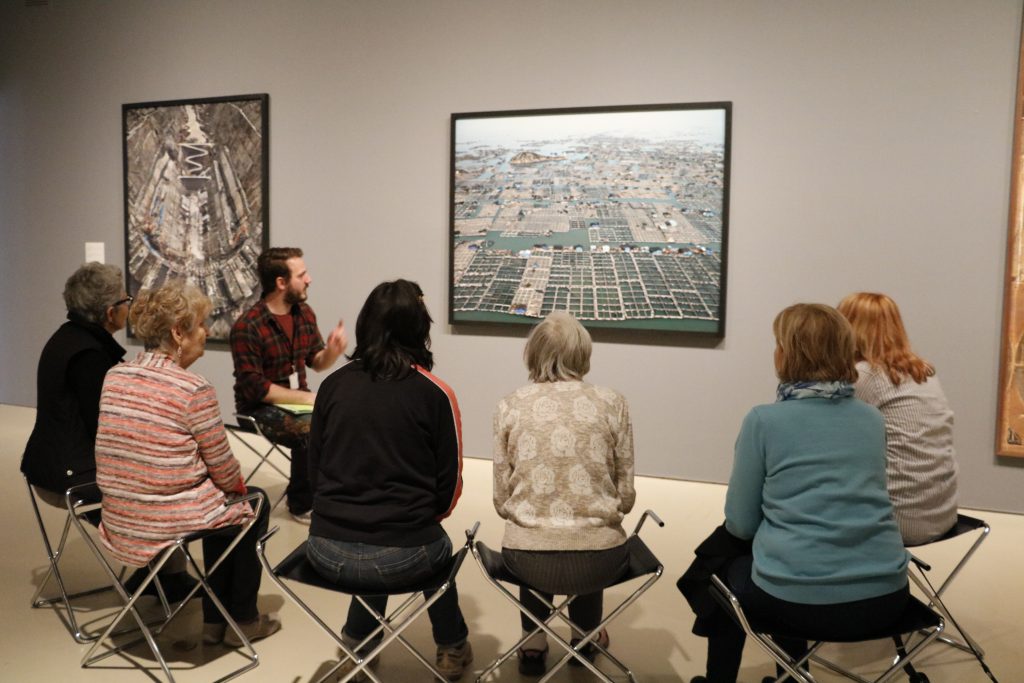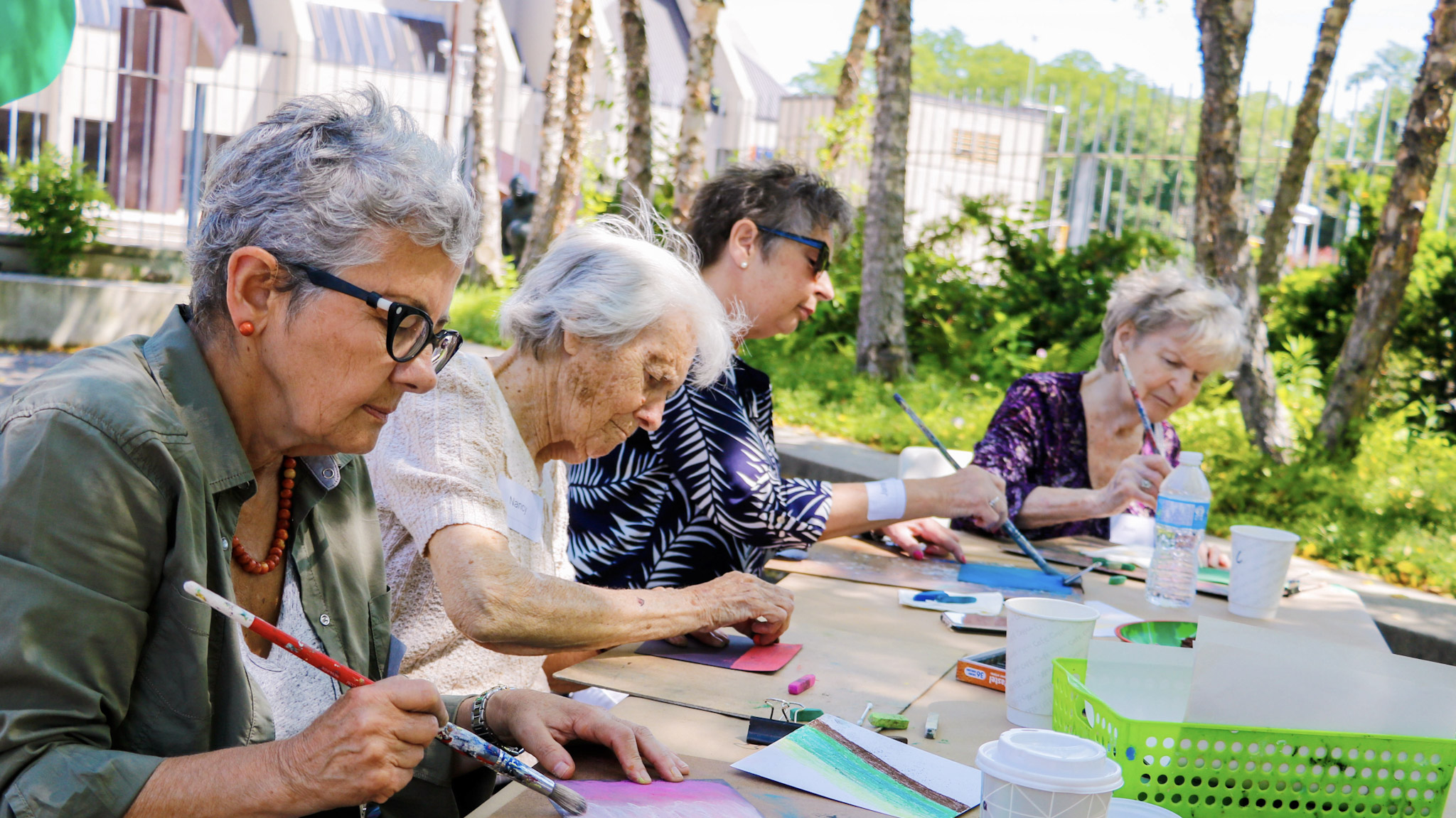January is Alzheimer’s Awareness Month in Canada. The month aims to raise awareness and challenge the stigma surrounding Alzheimer’s and dementia. As our communities age, we see the impact of dementia and the stigma that surrounds it becoming ever more widespread in Canada.
The Art Gallery of Hamilton has been presenting specialized programs for people living with dementia and their families for many years, and through this work, we have connected with many wonderful participants and their families. We know that awareness, inclusion and empowerment are essential to the wellbeing of people with dementia and their loved ones, and we have been privileged to participate in making this a pillar of our programming.
Dementia is a general term for loss of memory, communication skills, problem-solving and other thinking abilities that become severe enough to interfere with daily life. It describes a set of symptoms that can be caused by different illnesses, the most common being Alzheimer’s Disease.
While dementia can have significant impacts on a person’s life and abilities, many strengths remain throughout their life. It is important to know that each person who is living with dementia is unique. Some forms of memory, particularly memories formed earlier in their life, creativity, ability, and desire to communicate are all present far into a person’s journey with dementia. This is why engagement in meaningful experiences is important – it provides opportunities for connection and makes the most of the abilities and interests of each person.

Stigma and Social Isolation
The stigma or fear associated with a diagnosis or visible disability can shrink one’s social connections. An important health and social care challenge of the 21st century has been stated to be “social isolation and loneliness”.
People living with dementia have reported that their circle of friends shrinks once others learn of their diagnosis and that for many, stigma or fear further shrinks their social connectedness. Caregivers are also at risk of social isolation due to the same fears, and because of the competing demands of caregiving, work and family.
In a recent survey by the Hamilton Council on Aging, many important messages emerged. Only 20% of people surveyed said that people living with dementia feel like they are a valuable part of the community. And 47% of the respondents felt that there were no opportunities for people living with dementia to engage in community activities in the region. While this survey is specific to one region, it is easy to imagine similar feelings across the country.
To combat this, it is the job of our whole community to build opportunities for connection, support and engagement. For us, Artful Moments is a step towards this.
Combating Stigma
How can a gallery or cultural experience reduce stigma? Everyone has a role to play. The best ways to fight against stigma are to think of the person first, to model positive attitudes and actions, to encourage and celebrate participation, and to amplify the lived experiences of people living with dementia.
When people living with dementia feel understood, supported, and included, they participate in their community. Seeing them as active participants in gallery and museum programs or as regular visitors can change their sense of ability and (inclusion) as well as the perception that others have of them.
When organizations become educated about dementia, they can create opportunities for participation and inclusion. When they centre the experiences of people with dementia in their mandates, operations and activities, they become inclusive.
When members of the public see people living with dementia as active members of a community, the public’s preconceptions change, and stigma-based ideas are reduced.

The Power of Art and Culture
“Time spent in leisure and culture is often when our lives are most fulfilling when we can be ourselves with friends, family, and people in the community.” – Canadian Index of Wellbeing (University of Waterloo), 2016.
Experiences with art and culture facilitate experiences for participants no matter their level of subject knowledge, abilities, or circumstances. As an art gallery, the AGH uses experiences with works of art, but we know that all kinds of experiences can be facilitated through many different cultural and social experiences.
Art and culture can help you to see things in a new way. They can open you to new experiences, emotions, interpretations, and even recollections of past experiences. They can take you out of the everyday. When these experiences are shared, they become even more enjoyable.
Essential to social experiences is communication, though this can happen in many different ways, regardless of ability – with words, gestures, body language, art-making, and writing. Art can remove barriers that are caused by changes in language or speaking abilities.
When a family or friendship has changed from a partnership into a situation where one person is caring for the other, that relationship has changed, for both people. The beauty in art and object-based programs that are designed with the person with dementia, and their partner, in mind is that for a time that relationship shifts. The two partners work together and share an experience. They see themselves and their loved ones in a new light – seeing their abilities in action, or seeing talents that they didn’t know were there.
In addition, there are positive benefits for the family and friends who participate or accompany the person living with dementia. They can experience their loved ones engaging, expressing themselves, and enjoying the activity in a safe, comfortable environment. They can also experience and appreciate the experience themselves, socializing and sharing time with others. A growing body of research confirms the anecdotal evidence that the arts can improve quality of life, reduce stress, and allow the person to better connect to the world.
Art and object-based programs are ideal to support the abilities and interests of the participant. These programs facilitate and exchange of ideas, they make connections between the participants and the world at large, and they spark connections to personal experiences and long-term memory. And most importantly, everyone participates in a meaningful and enjoyable activity.
What can you do?
● Learn more about dementia. There are many resources available in our community.
● Be aware of your unconscious biases and the words you choose.
● Learn more about programs and opportunities in your community and the cultural organizations you visit.
● Learn about Artful Moments – AGH offers programs for many audiences throughout the year, as well as professional development opportunities for museums and cultural organizations. Visit www.artgalleryofhamilton.com and www.artfulmoments.ca for more information, or email artfulmoments@artgalleryofhamilton.com.
● Register a loved one living with early stage dementia for our Artful Moments Winter Sessions: https://www.artgalleryofhamilton.com/program/am-memory-care-wintersessions/
● Visit the Alzheimer Society for more information and resources: https://alzheimer.ca/en/take-action/change-minds/alzheimers-awareness-month


